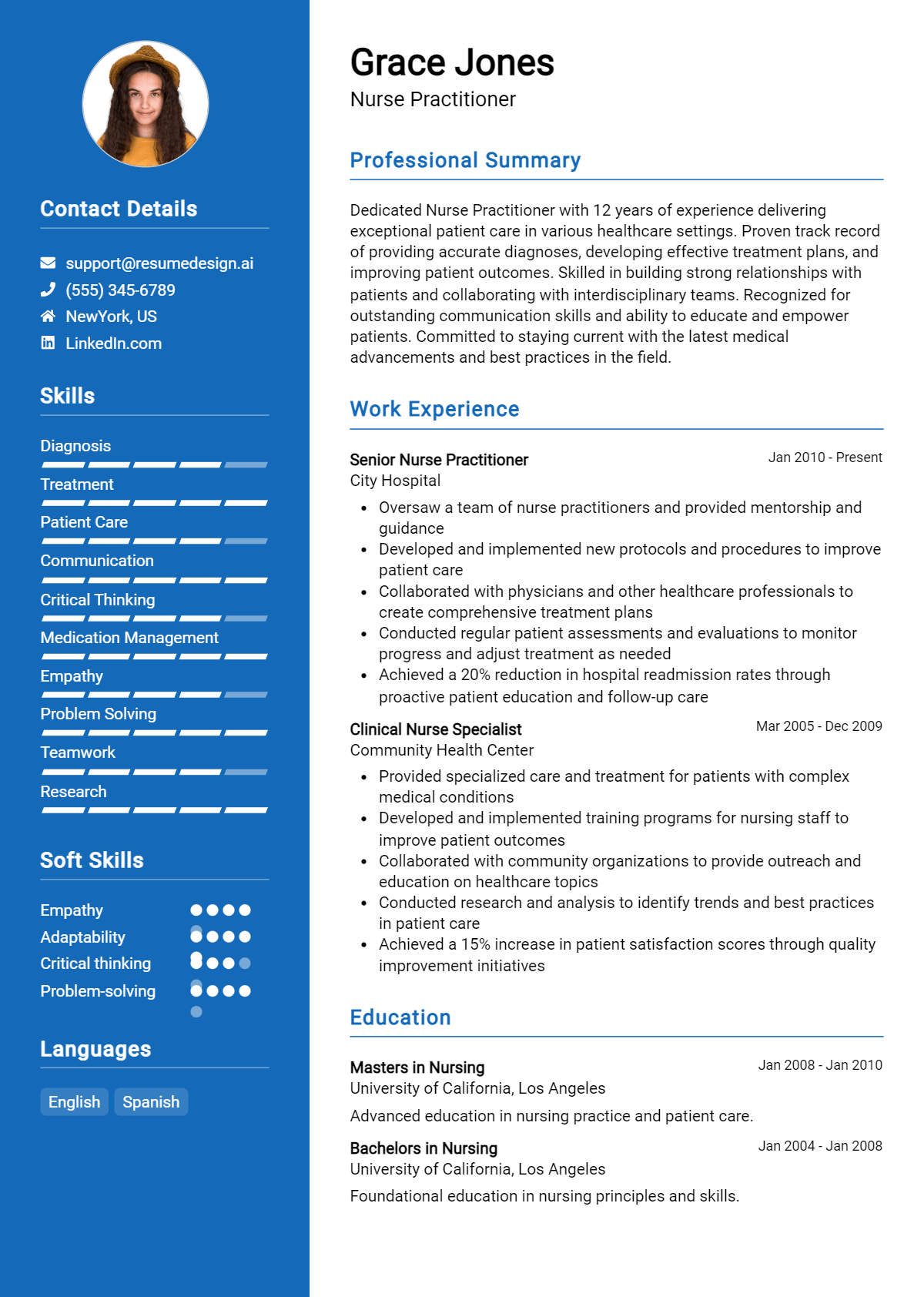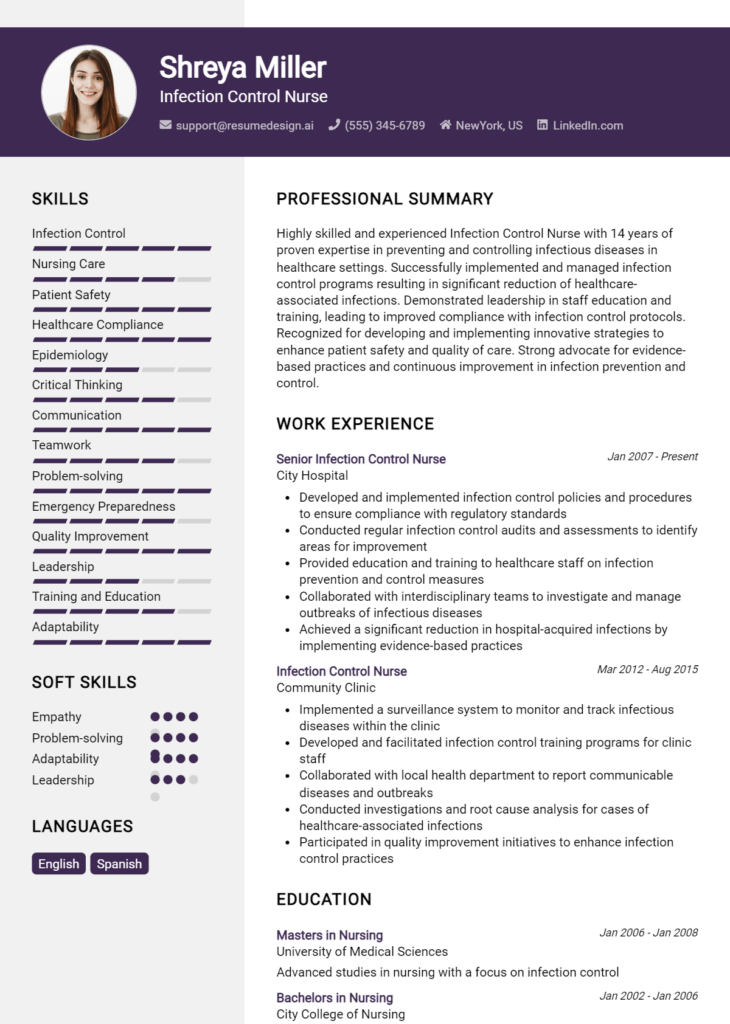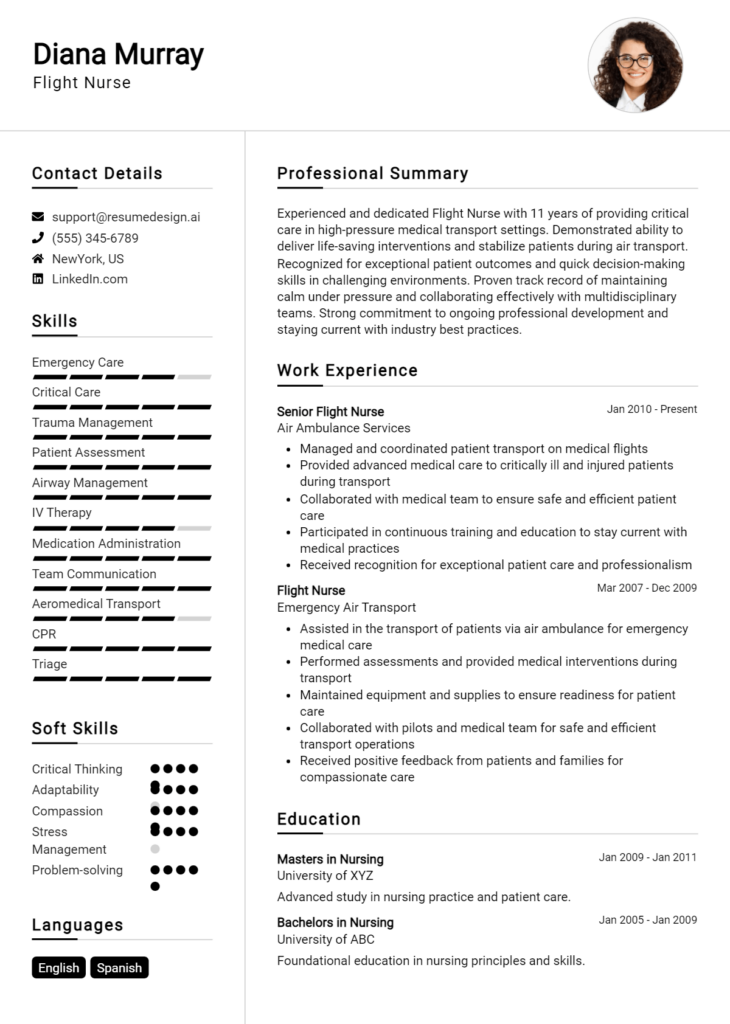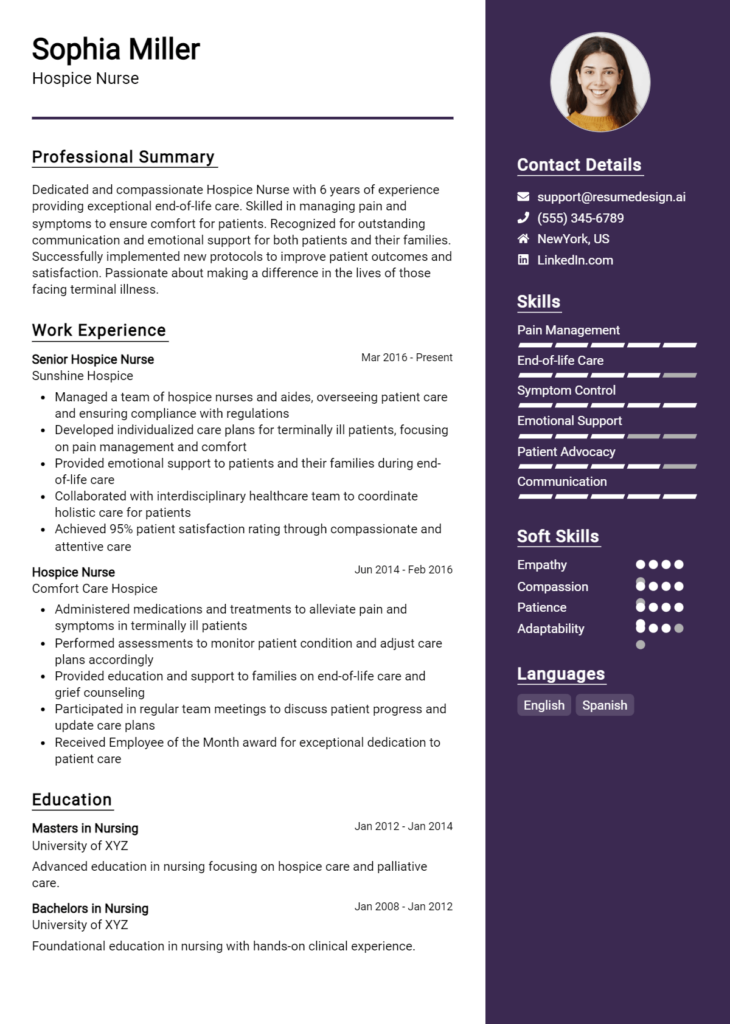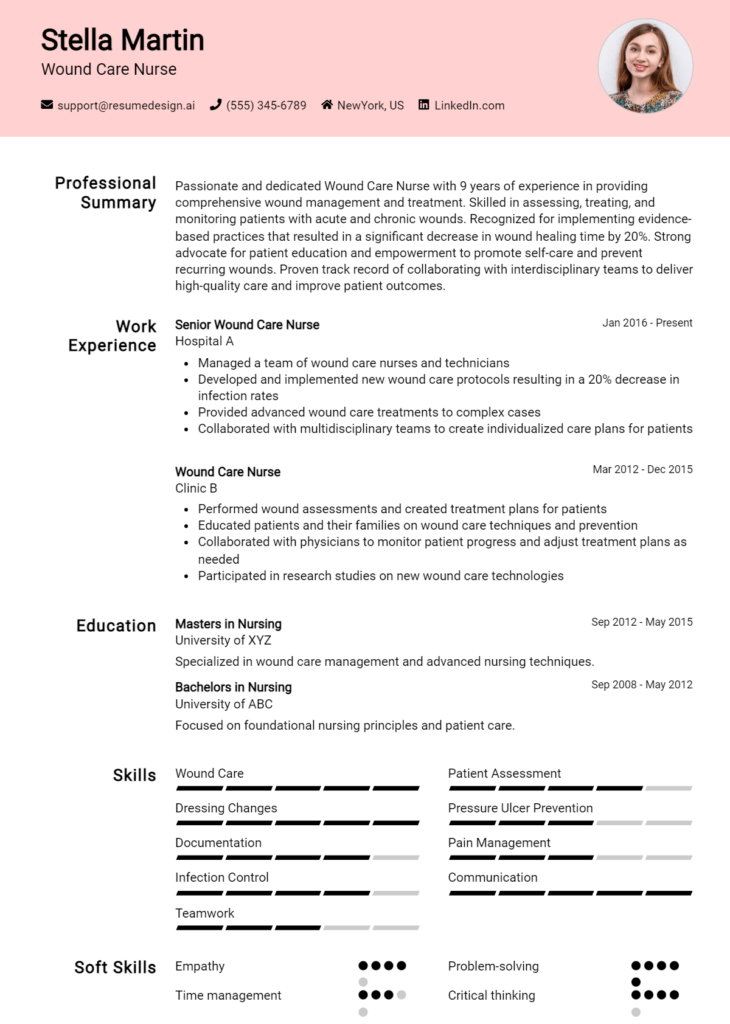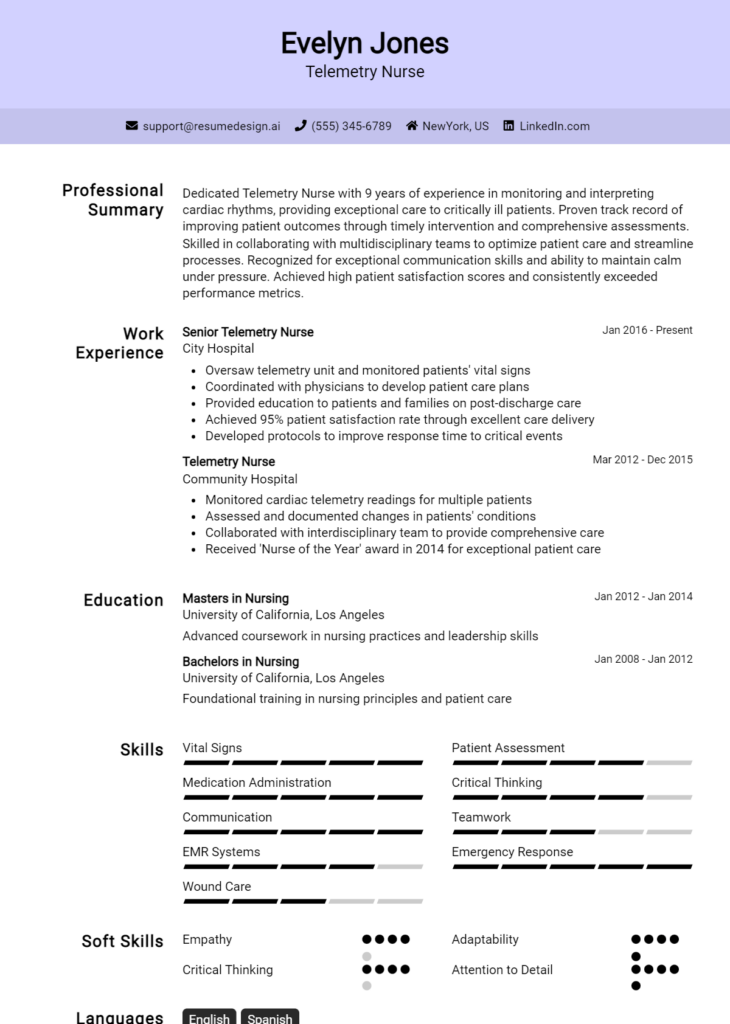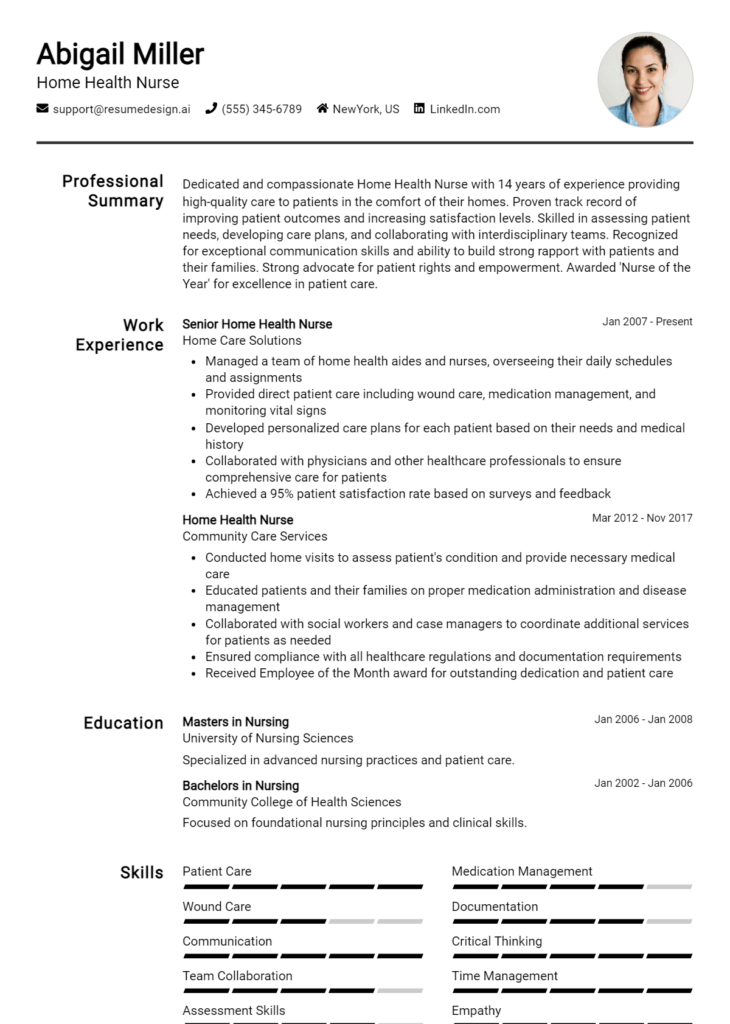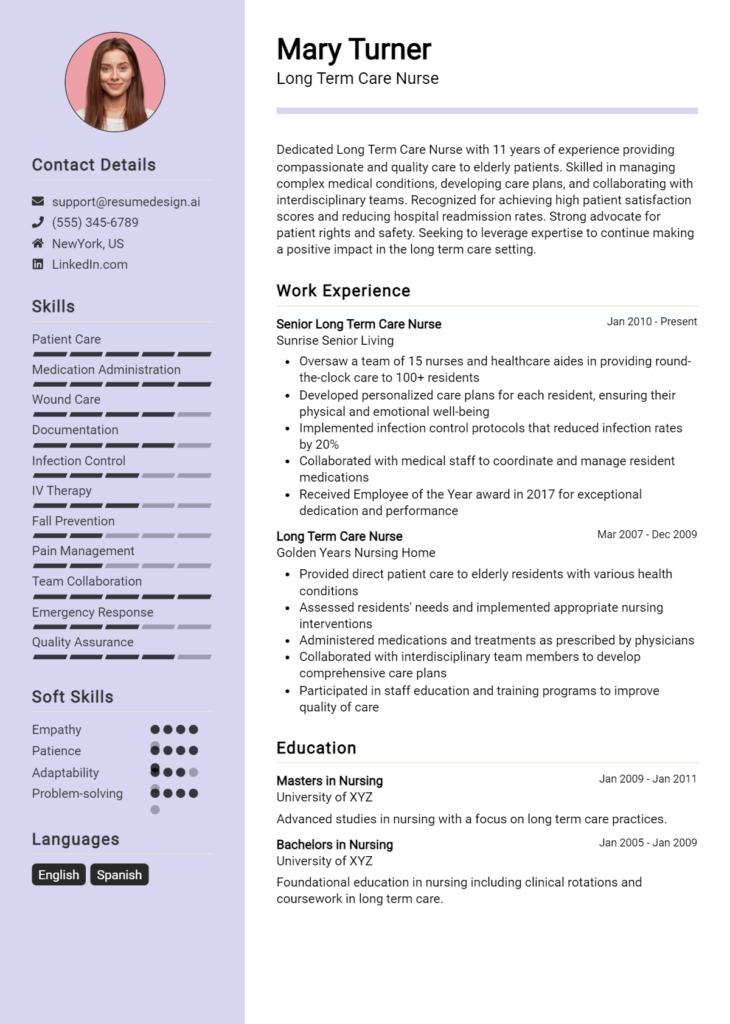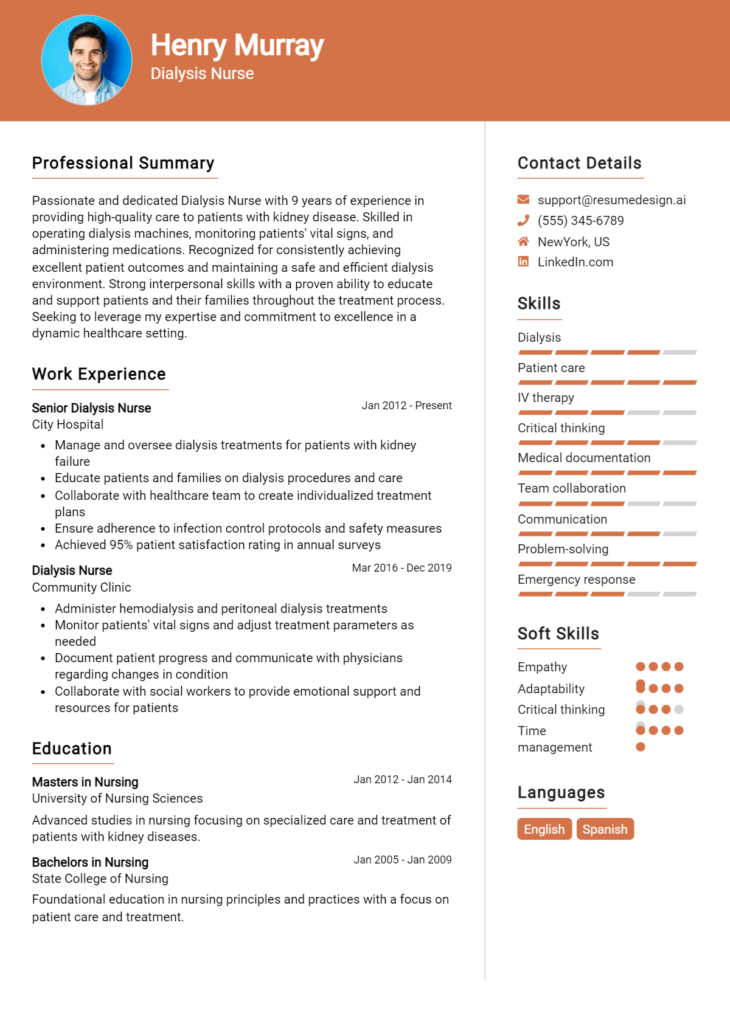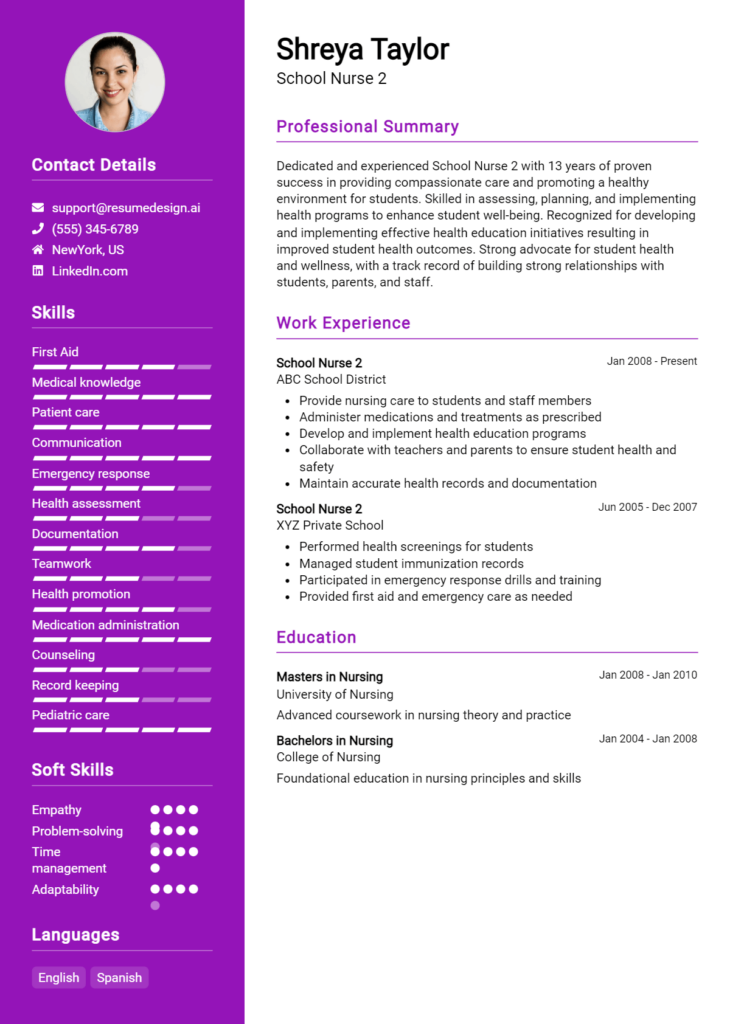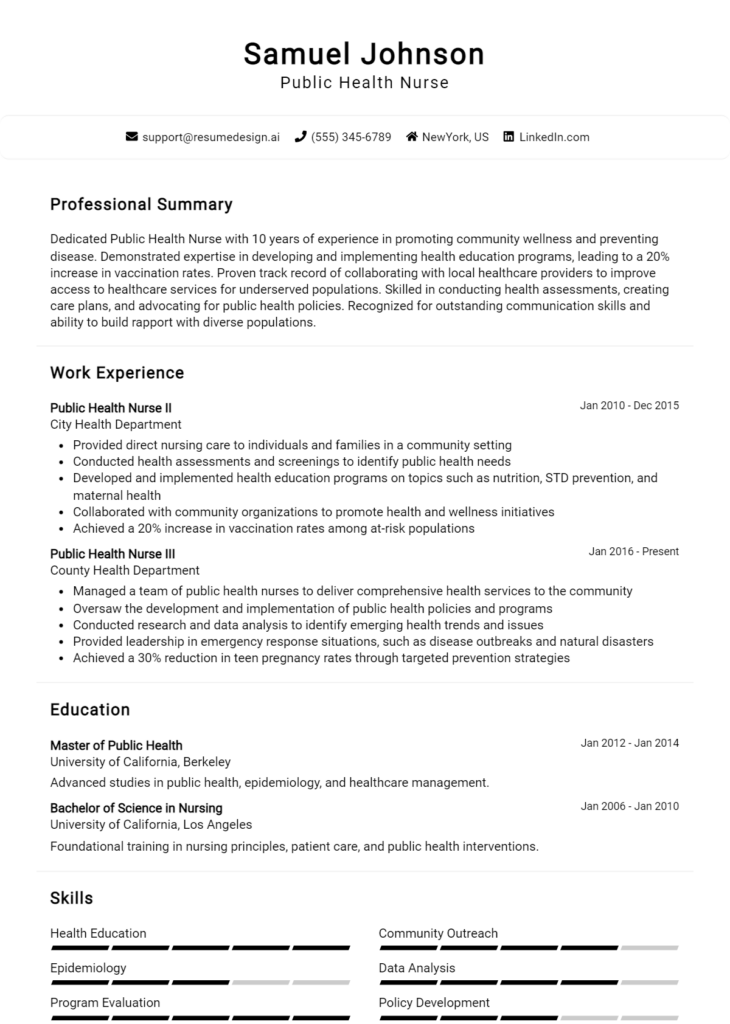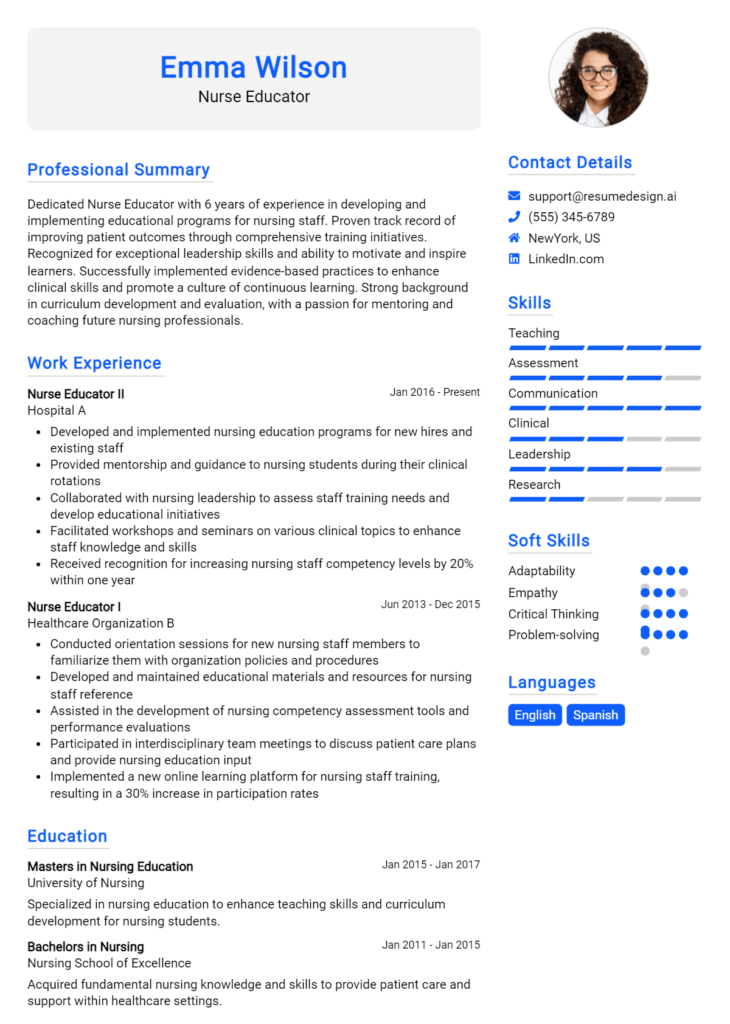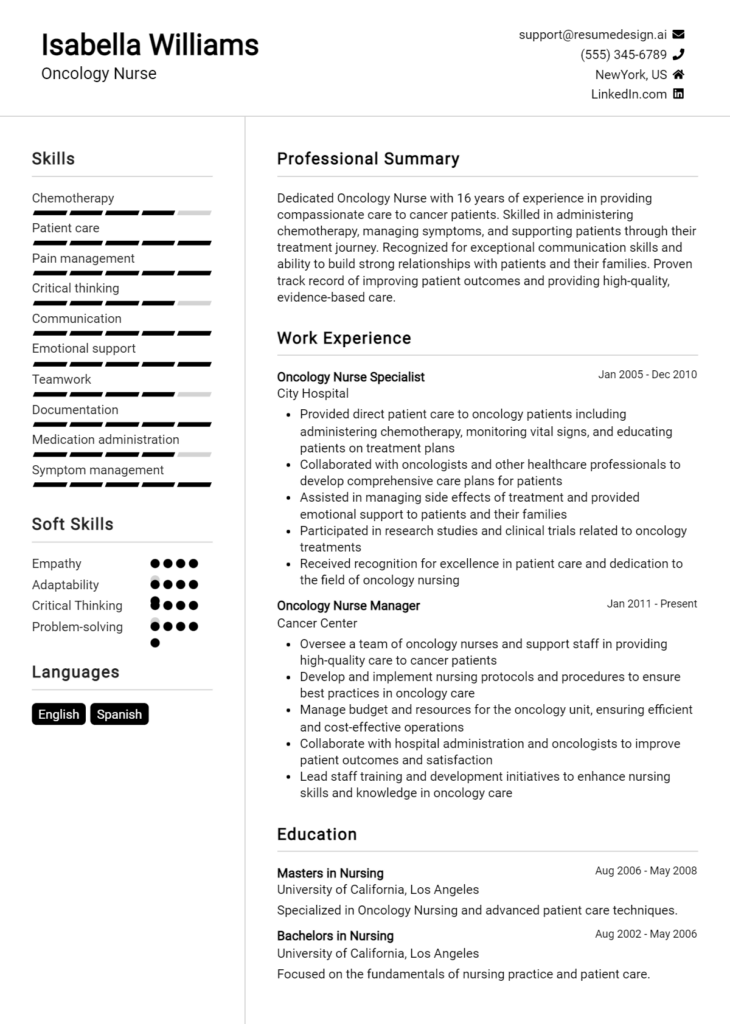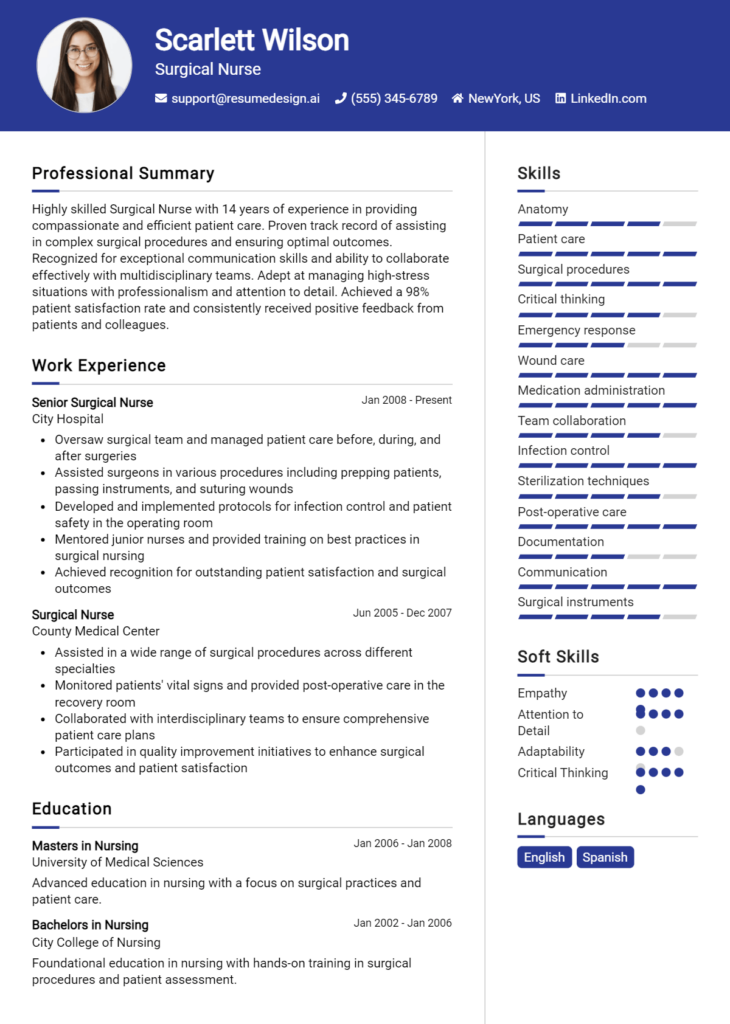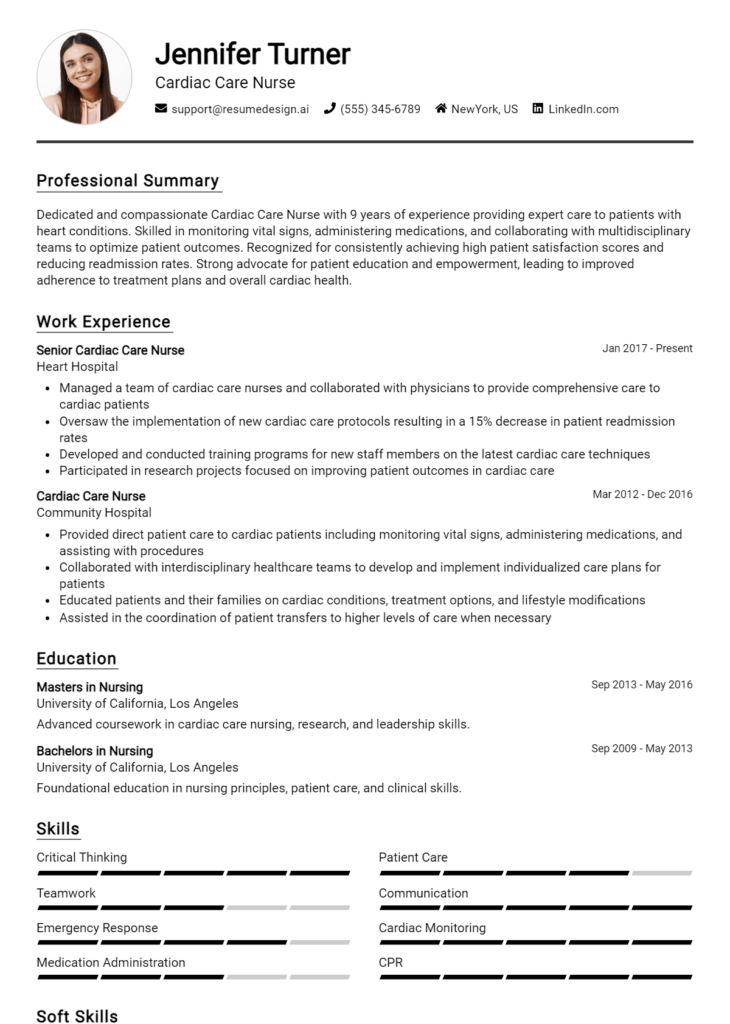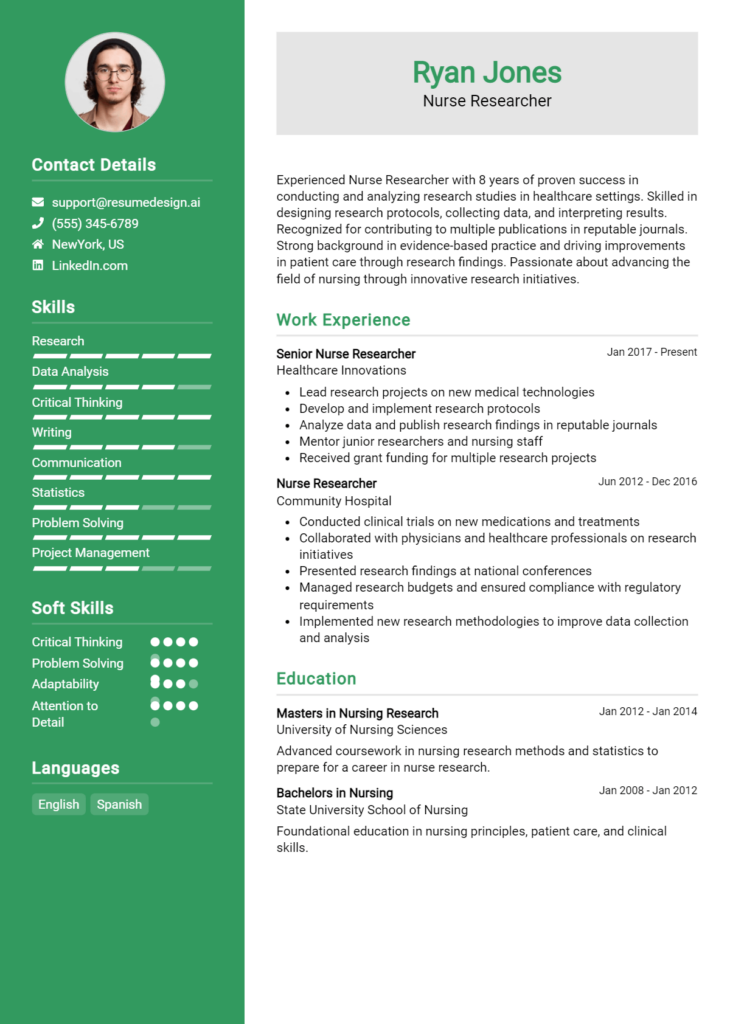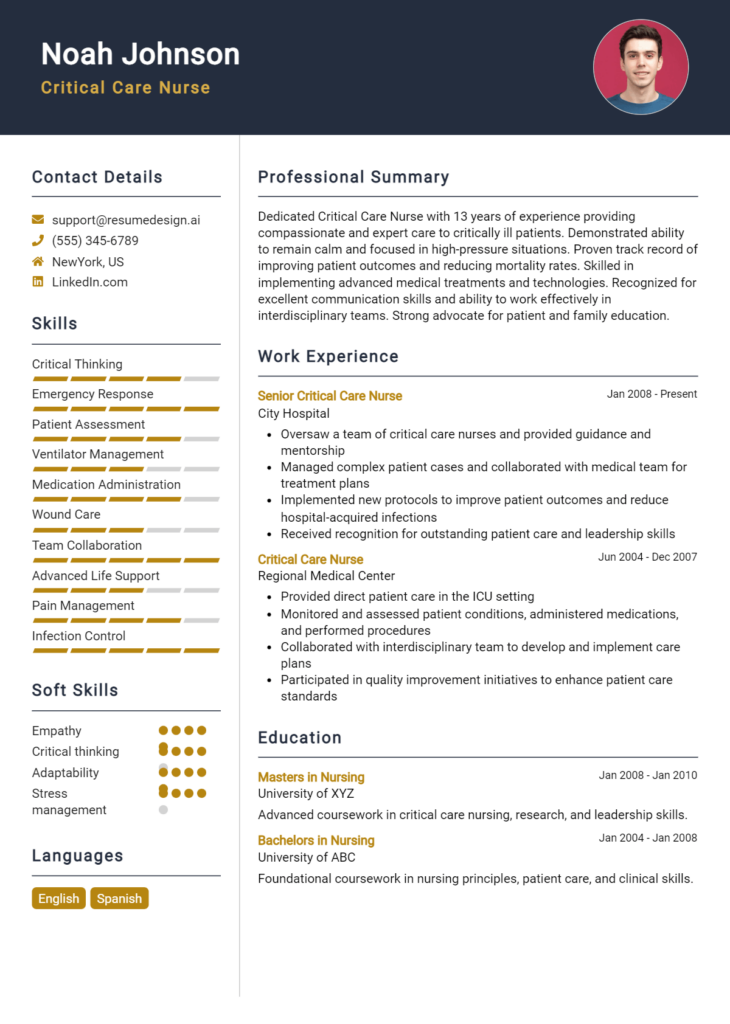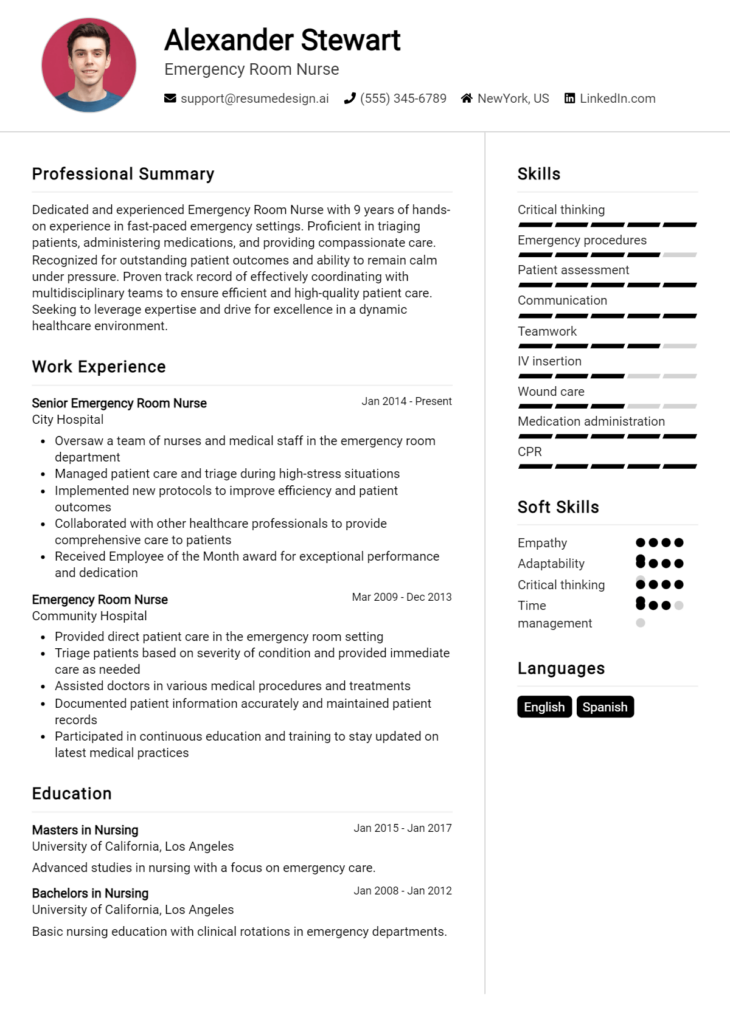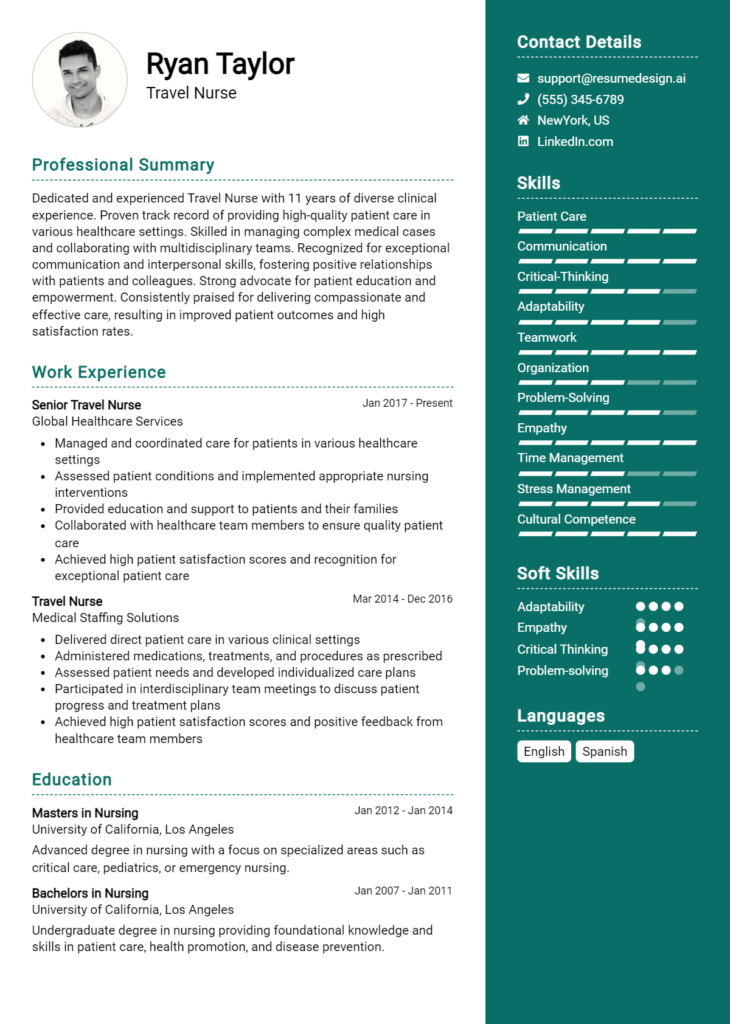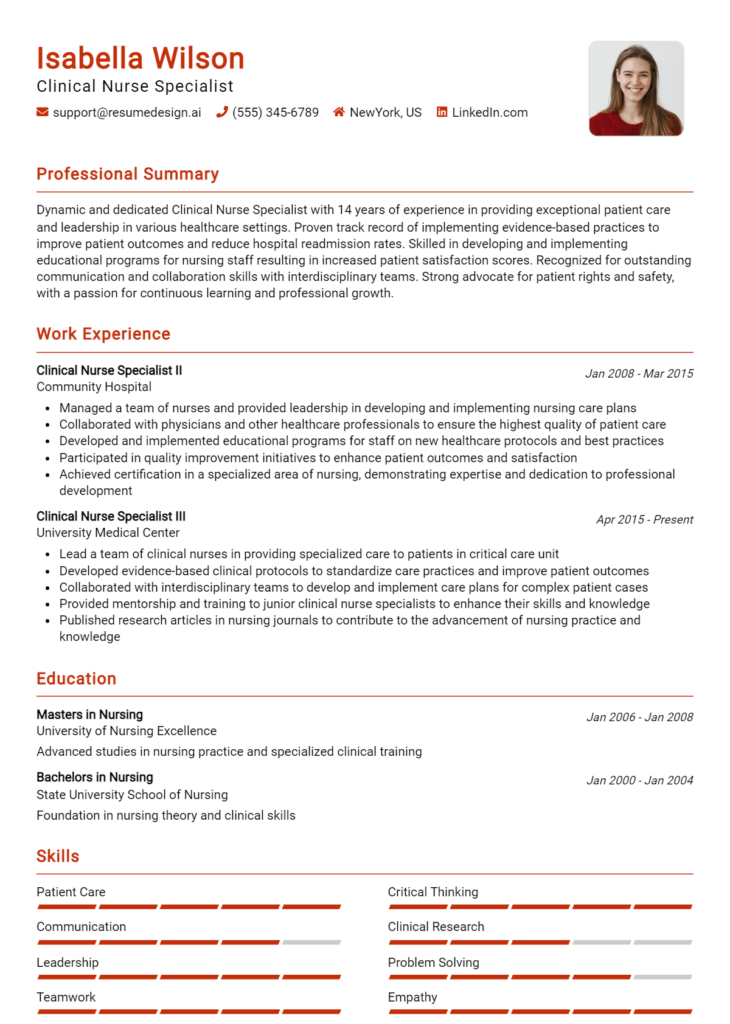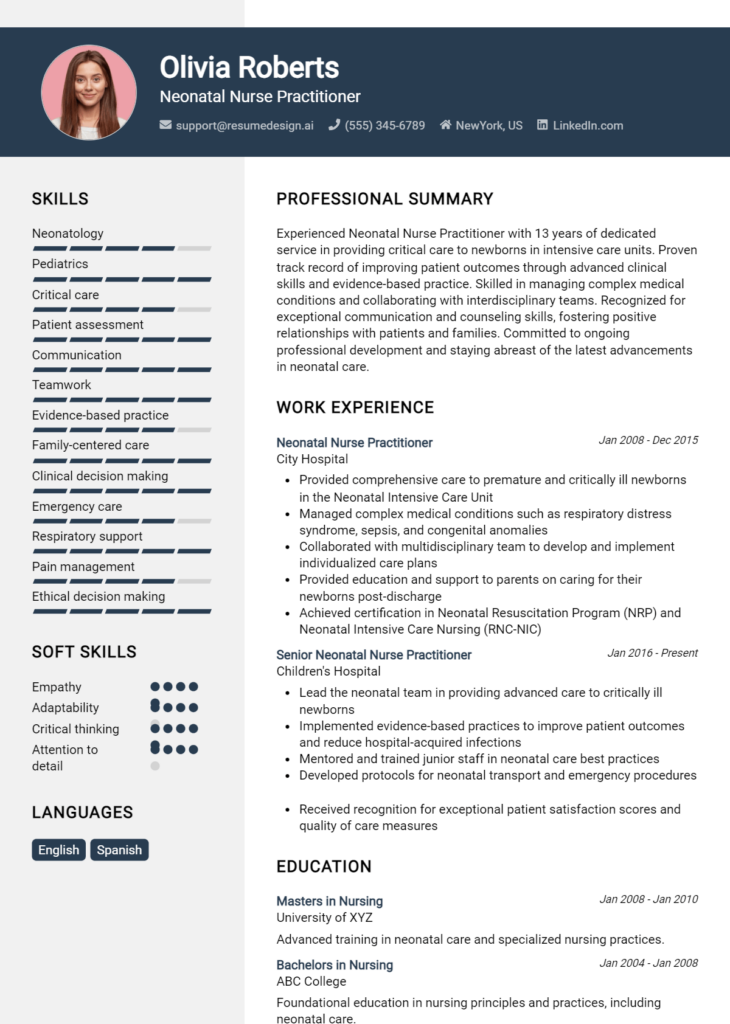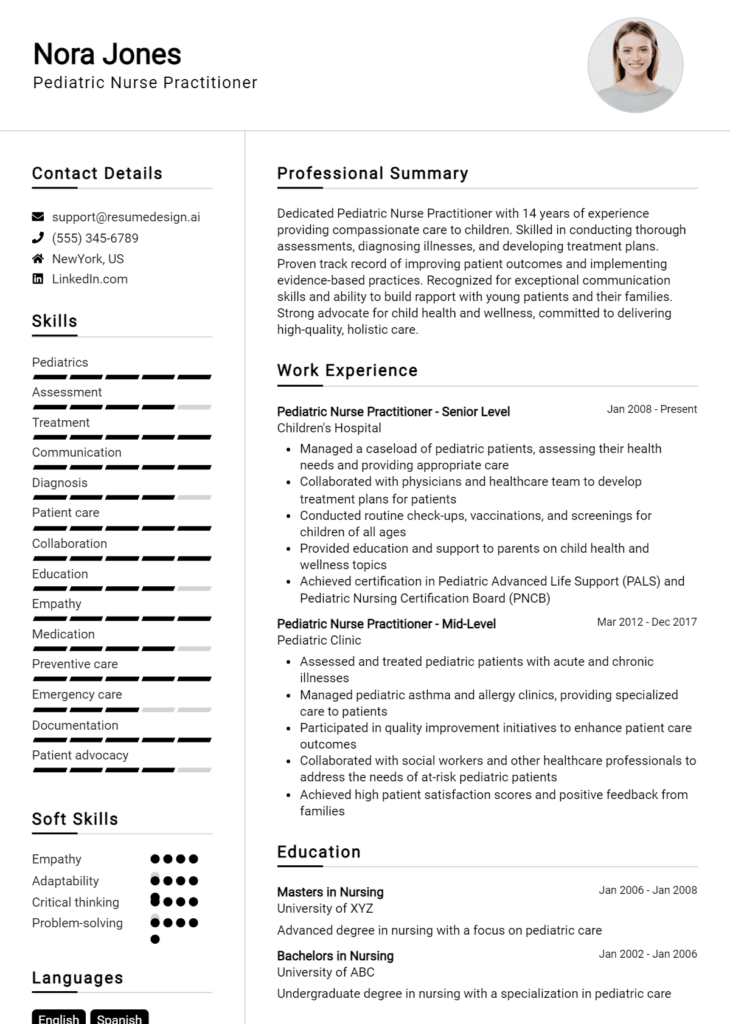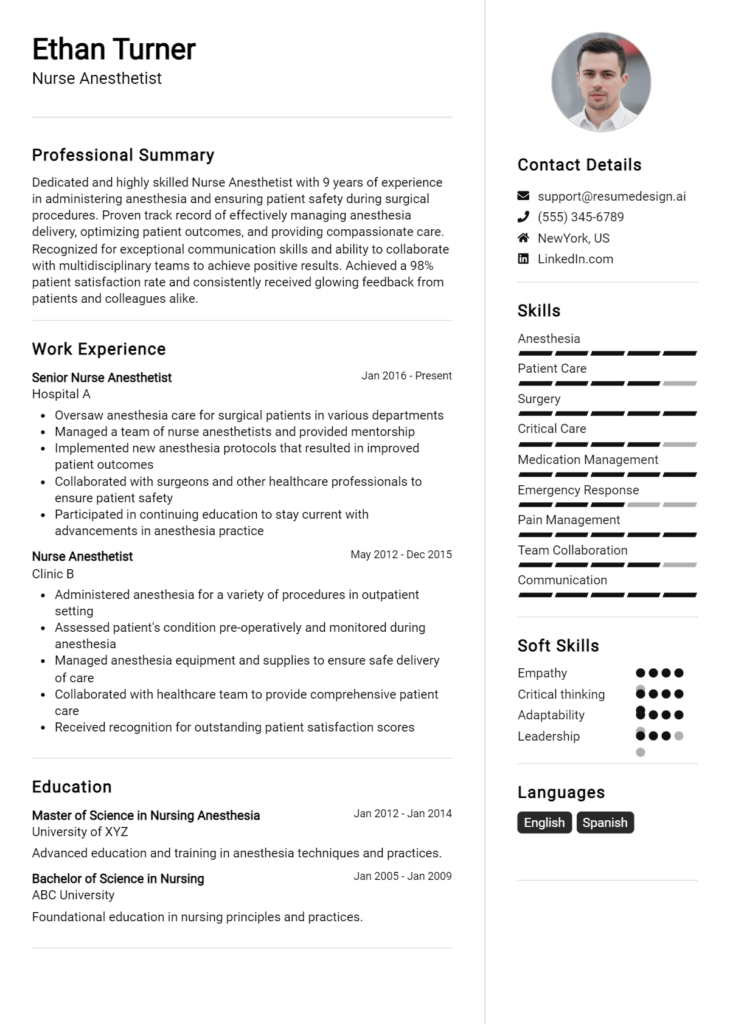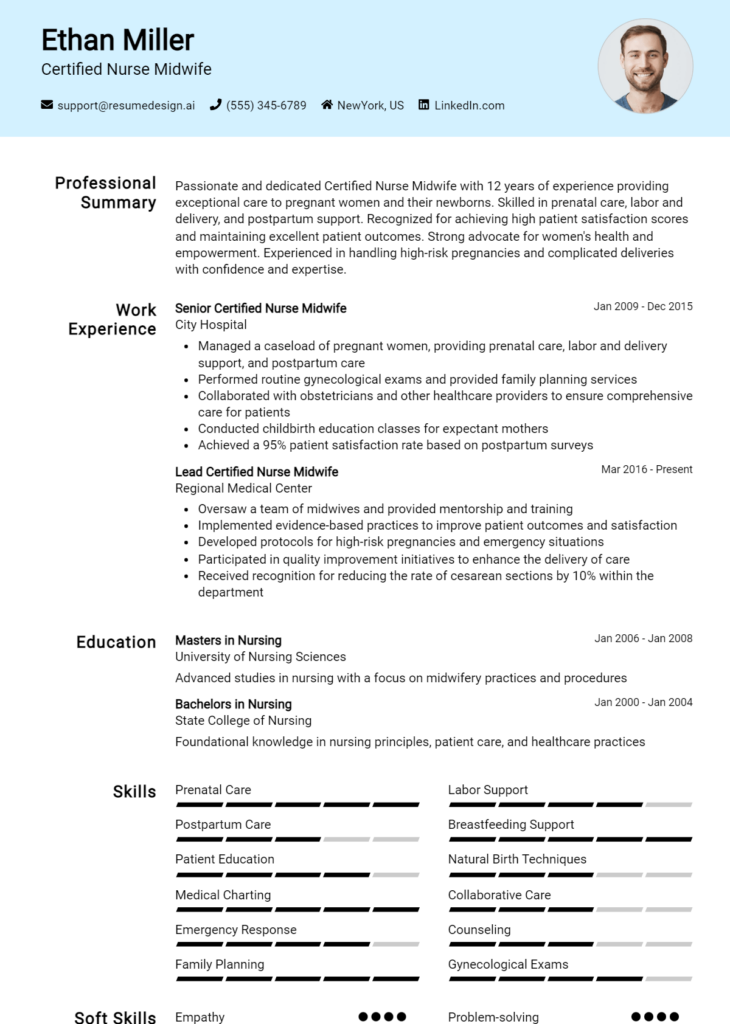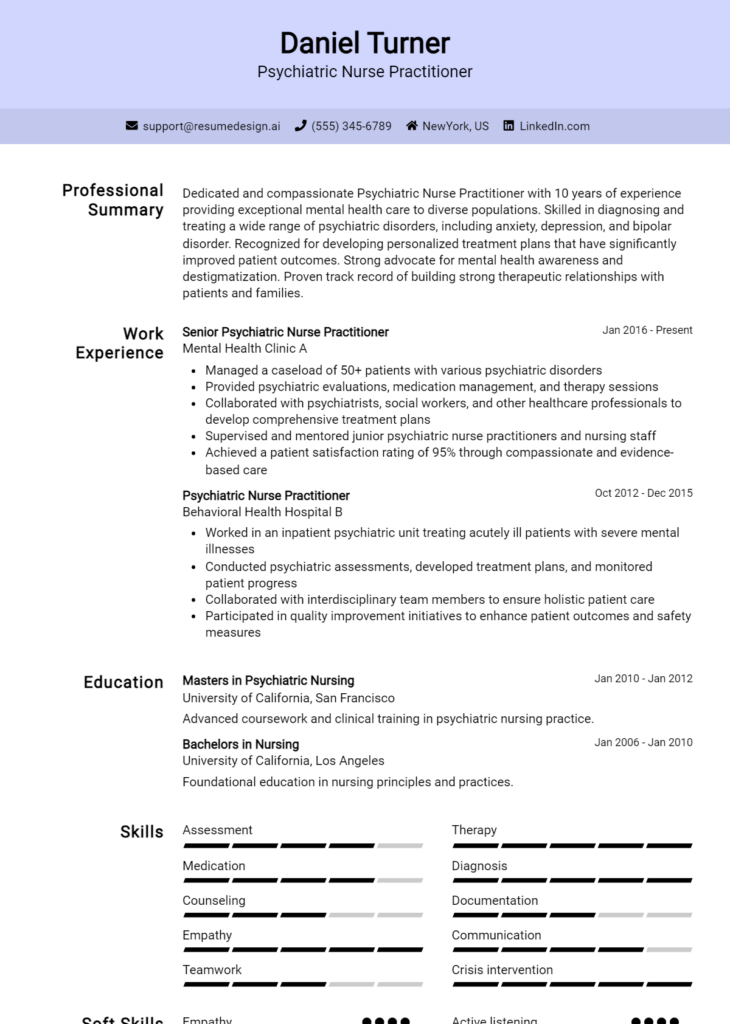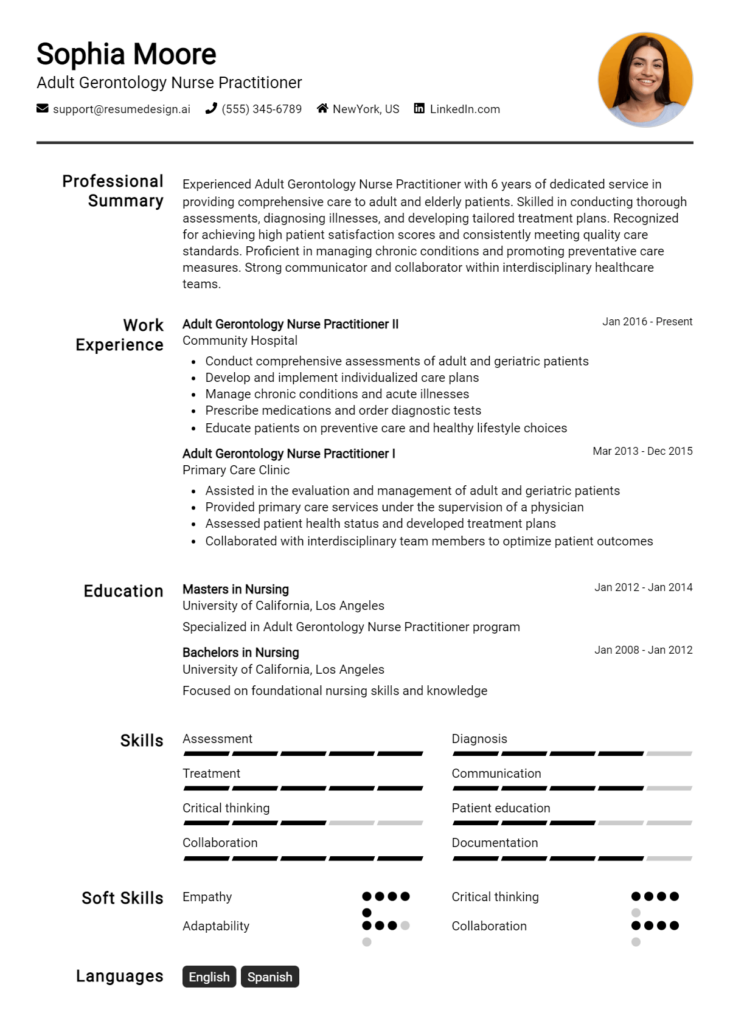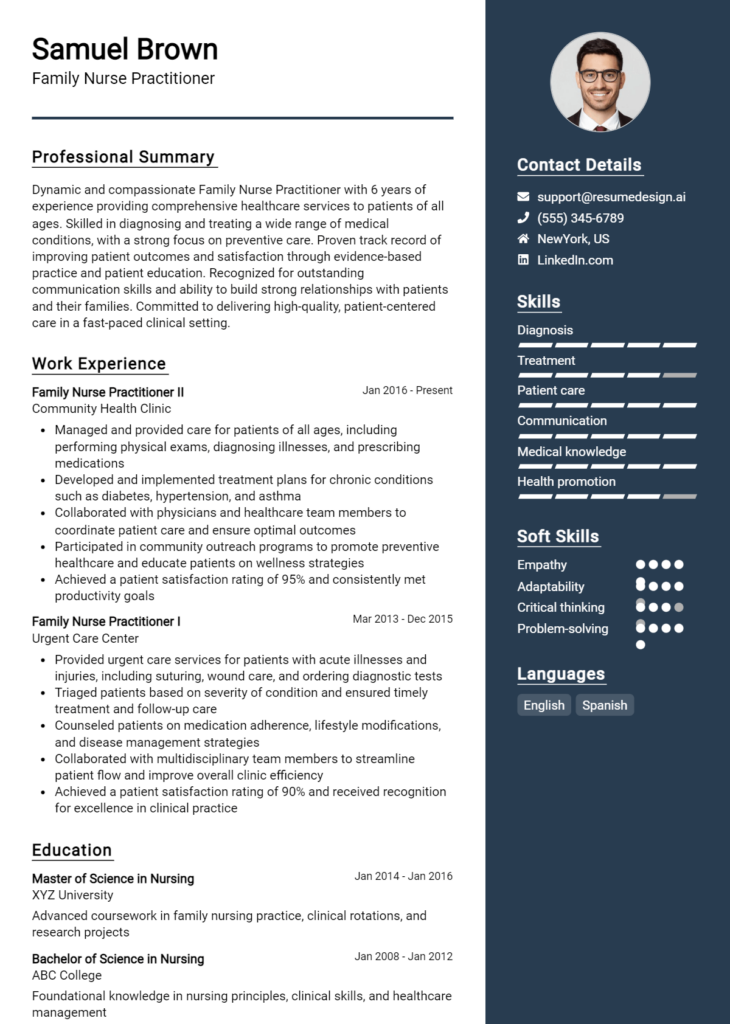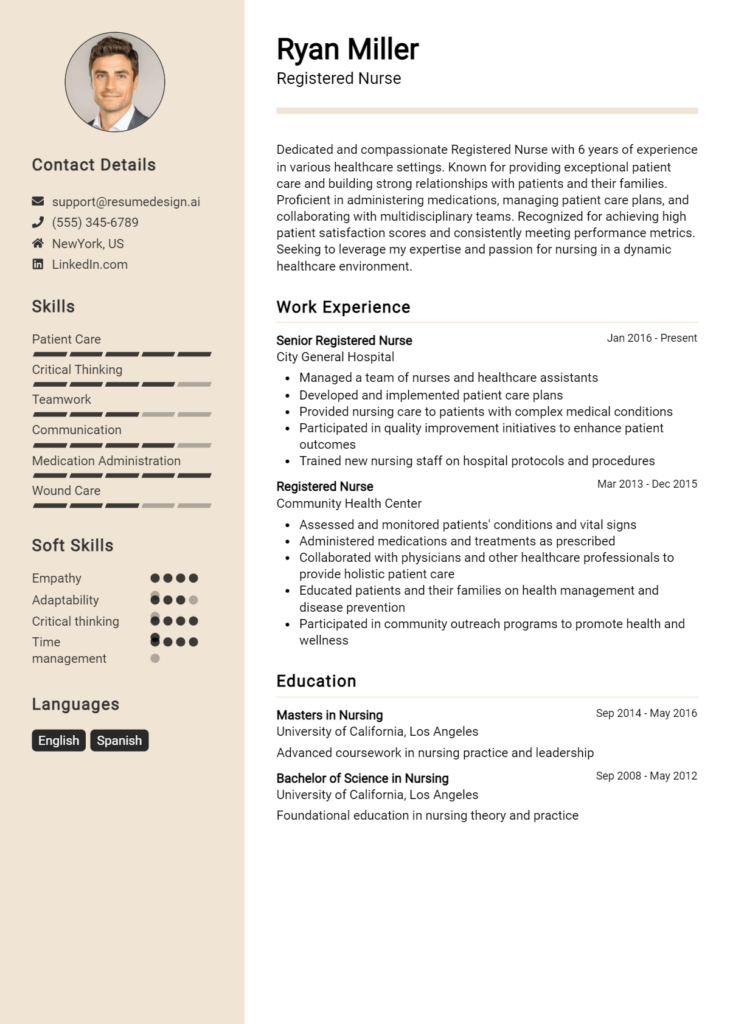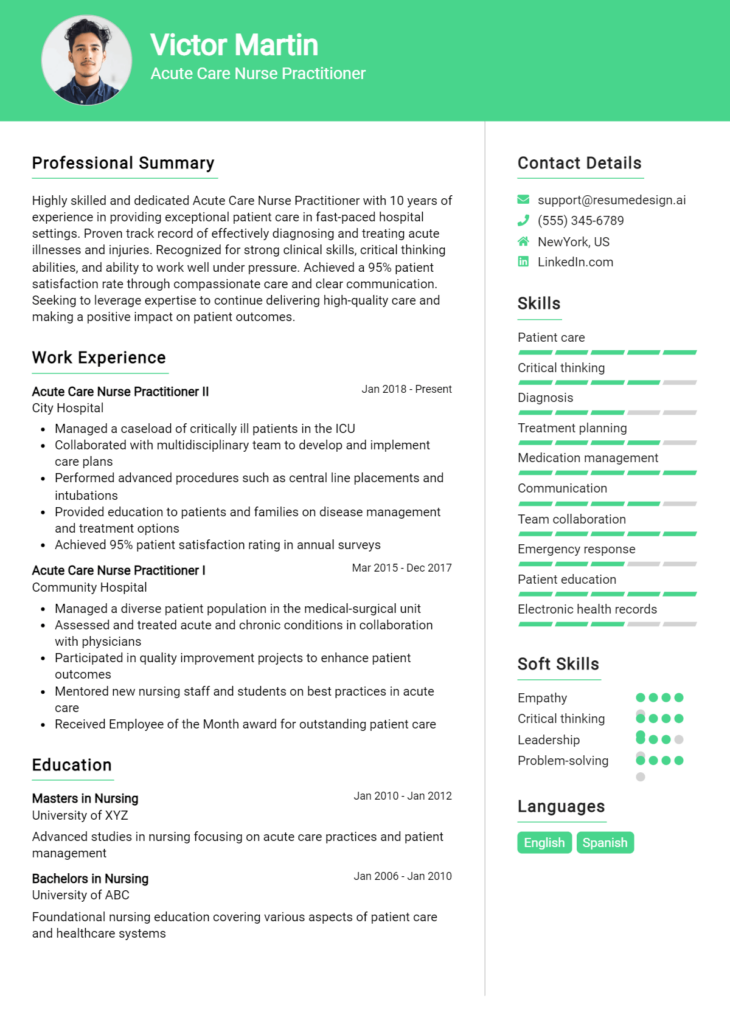Nurse Practitioner Core Responsibilities
Nurse Practitioners (NPs) play a vital role in healthcare, bridging various departments by providing patient-centered care and ensuring seamless communication between medical teams. Their core responsibilities include diagnosing conditions, developing treatment plans, and managing patient care. Essential skills encompass technical proficiency, operational management, and strong problem-solving abilities, which are crucial for enhancing patient outcomes and meeting organizational goals. A well-crafted resume effectively highlights these qualifications, showcasing an NP's expertise to potential employers.
Common Responsibilities Listed on Nurse Practitioner Resume
- Conducting comprehensive patient assessments and evaluations
- Diagnosing and managing acute and chronic illnesses
- Prescribing medications and monitoring their effects
- Developing and implementing individualized care plans
- Educating patients and families on health conditions and preventive care
- Collaborating with interdisciplinary teams to enhance patient care
- Performing minor procedures and diagnostic tests
- Maintaining accurate and up-to-date patient records
- Participating in research and clinical trials
- Staying informed about the latest healthcare practices and regulations
- Mentoring and supervising nursing staff and students
- Advocating for patient needs and healthcare access
High-Level Resume Tips for Nurse Practitioner Professionals
In today's competitive healthcare landscape, a well-crafted resume is essential for Nurse Practitioner professionals seeking to make a lasting impression on potential employers. Your resume is often the first opportunity to showcase your skills, qualifications, and achievements, serving as a critical marketing tool that can open doors to interviews and job offers. It's important that your resume not only reflects your clinical expertise but also highlights your unique contributions to patient care and the healthcare team. In this guide, we will provide practical and actionable resume tips specifically tailored for Nurse Practitioner professionals to help you stand out in the job market.
Top Resume Tips for Nurse Practitioner Professionals
- Tailor your resume to match the specific job description, using relevant keywords and phrases that align with the position.
- Highlight your clinical experience prominently, showcasing the settings you’ve worked in, such as hospitals, clinics, or specialty practices.
- Quantify your achievements whenever possible, using metrics like patient outcomes, number of patients managed, or improvements in care protocols.
- Include a strong summary statement at the top of your resume that encapsulates your skills, experience, and career goals.
- List your relevant certifications and licenses clearly, ensuring they are up to date and pertinent to the job you are applying for.
- Showcase your skills in areas such as patient assessment, diagnosis, treatment planning, and interdisciplinary collaboration.
- Utilize bullet points for clarity and conciseness, making your resume easy to read and navigate quickly.
- Incorporate continuing education and professional development courses to demonstrate your commitment to lifelong learning in the field.
- Use a clean, professional format with consistent fonts and spacing to enhance readability and presentation.
- Consider including a section for volunteer work or community service related to healthcare, as it can illustrate your dedication and compassion as a practitioner.
By implementing these tips, you can significantly enhance your resume's effectiveness, increasing your chances of landing a job in the Nurse Practitioner field. A polished and tailored resume not only showcases your qualifications but also demonstrates your professionalism and attention to detail, making you a more attractive candidate to potential employers.
Why Resume Headlines & Titles are Important for Nurse Practitioner
In today's competitive job market, a well-crafted resume headline or title is crucial for Nurse Practitioners seeking new opportunities. A strong headline serves as the first impression for hiring managers, providing a snapshot of the candidate's qualifications and expertise in a concise manner. This immediate attention-grabber can effectively summarize the applicant's key strengths, making it easier for employers to identify top talent. A resume headline should be relevant to the position being applied for, ensuring it resonates with the specific requirements of the job while showcasing the candidate's unique value proposition.
Best Practices for Crafting Resume Headlines for Nurse Practitioner
- Keep it concise: Aim for one impactful phrase that captures your essence.
- Be role-specific: Tailor the headline to reflect the specific Nurse Practitioner position you are applying for.
- Highlight key qualifications: Focus on your most relevant skills and experiences that align with the job description.
- Use action-oriented language: Employ strong verbs that convey proactivity and effectiveness.
- Incorporate relevant keywords: Utilize industry-specific terms that reflect your expertise.
- Avoid clichés: Steer clear of overused phrases that can dilute your uniqueness.
- Showcase your specialty: If applicable, emphasize your area of expertise, such as pediatrics, geriatrics, or mental health.
- Update regularly: Revise your headline for different applications to ensure it remains relevant.
Example Resume Headlines for Nurse Practitioner
Strong Resume Headlines
Compassionate Family Nurse Practitioner with 5+ Years of Experience in Patient-Centered Care
Dedicated Pediatric Nurse Practitioner Specializing in Developmental Assessments and Family Education
Experienced Nurse Practitioner with Proven Success in Managing Chronic Illnesses and Enhancing Patient Outcomes
Weak Resume Headlines
Nurse Practitioner Seeking Job
Healthcare Professional with Experience
Strong headlines are effective because they immediately communicate the candidate's unique qualifications, skills, and focus areas, making it easy for hiring managers to see the value they bring. In contrast, weak headlines lack specificity and relevance, leaving hiring managers unimpressed and unsure about the candidate's fit for the role. By avoiding generic language and instead opting for precise and impactful statements, candidates can enhance their chances of being noticed in a crowded applicant pool.
Writing an Exceptional Nurse Practitioner Resume Summary
A well-crafted resume summary is essential for Nurse Practitioners as it serves as the first impression for hiring managers. In a competitive job market, a strong summary quickly captures attention by highlighting key skills, relevant experience, and notable accomplishments that align with the specific job role. It should be concise and impactful, effectively conveying the candidate's value in just a few sentences. Tailoring the summary to the job description not only demonstrates the candidate's fit for the position but also showcases their commitment to addressing the needs of the employer.
Best Practices for Writing a Nurse Practitioner Resume Summary
- Quantify achievements where possible to demonstrate impact.
- Focus on relevant skills that match the job description.
- Use action verbs to convey a sense of proactivity.
- Tailor the summary for each application to reflect the specific role.
- Highlight unique qualifications, such as specialized training or certifications.
- Keep it concise, ideally within 3-5 sentences.
- Include keywords from the job posting to enhance visibility in applicant tracking systems.
- Showcase a blend of clinical expertise and interpersonal skills.
Example Nurse Practitioner Resume Summaries
Strong Resume Summaries
Compassionate Nurse Practitioner with over 5 years of experience in acute care settings, successfully managing a caseload of 150+ patients. Achieved a 20% improvement in patient satisfaction scores through the implementation of personalized care plans.
Dedicated Nurse Practitioner specializing in pediatric care, with a proven track record of diagnosing and treating common childhood ailments. Increased immunization rates by 35% in community health outreach programs over the last year.
Experienced Nurse Practitioner with expertise in chronic disease management and preventative care. Developed and led a diabetes education program that resulted in a 40% reduction in emergency visits among participants.
Weak Resume Summaries
Nurse Practitioner with experience in various medical fields looking for a new job opportunity.
Highly motivated healthcare professional seeking to provide quality care and improve patient outcomes.
The strong resume summaries are effective because they provide specific achievements and relevant skills, demonstrating clear value to potential employers. They quantify results and reflect the candidate’s direct impact on patient care and outcomes. In contrast, the weak summaries lack detail and specificity, making them too generic and failing to effectively showcase the candidate's unique qualifications or contributions to previous roles.
Work Experience Section for Nurse Practitioner Resume
The work experience section of a Nurse Practitioner resume is a critical component that effectively showcases a candidate's technical skills, leadership abilities, and commitment to delivering high-quality patient care. This section not only highlights relevant clinical experiences but also illustrates how the candidate has successfully managed teams, collaborated with healthcare professionals, and contributed to improved patient outcomes. By quantifying achievements and aligning work history with industry standards, candidates can present a compelling narrative of their professional journey and demonstrate their readiness for advanced practice roles.
Best Practices for Nurse Practitioner Work Experience
- Use specific metrics to quantify patient outcomes, such as percentage improvements in recovery times or patient satisfaction scores.
- Highlight leadership roles in team settings, demonstrating your ability to guide multidisciplinary teams effectively.
- Showcase relevant technical skills, including advanced diagnostic procedures and treatment methodologies.
- Align your experiences with current industry standards and best practices in patient care.
- Incorporate action verbs to convey your contributions clearly and dynamically.
- Focus on collaborative projects that illustrate your ability to work effectively with other healthcare professionals.
- Tailor your work experiences to the specific Nurse Practitioner role you are applying for.
- Include continuing education or certifications that enhance your clinical expertise.
Example Work Experiences for Nurse Practitioner
Strong Experiences
- Led a team of 5 healthcare providers in a chronic disease management program, resulting in a 30% reduction in hospital readmissions over 12 months.
- Implemented a new electronic health record system that improved patient data retrieval times by 40%, enhancing workflow efficiency across the department.
- Conducted over 500 patient assessments in a busy outpatient clinic, achieving a 95% patient satisfaction rate through personalized care plans.
- Collaborated with a multidisciplinary team to develop a community health initiative, which increased local vaccinations by 25% within the first year.
Weak Experiences
- Worked in a hospital setting for several years.
- Helped with patient care tasks and assisted doctors.
- Participated in some team meetings.
- Provided care to various patients without specific details.
The examples provided illustrate a clear distinction between strong and weak experiences. Strong experiences are characterized by specific, quantifiable outcomes and demonstrate leadership and collaboration, making the candidate stand out. In contrast, weak experiences lack detail and do not convey the candidate's impact or contributions, ultimately failing to engage potential employers.
Education and Certifications Section for Nurse Practitioner Resume
The education and certifications section of a Nurse Practitioner resume is crucial as it serves as a testament to the candidate's academic qualifications and professional development. This section not only showcases the foundational knowledge acquired through formal education but also highlights industry-relevant certifications and ongoing learning efforts that are essential for providing high-quality patient care. By including relevant coursework, specialized training, and certifications, candidates can significantly enhance their credibility and demonstrate their commitment to staying current in the ever-evolving healthcare landscape, aligning themselves with the specific requirements of the job role.
Best Practices for Nurse Practitioner Education and Certifications
- Prioritize recent and relevant degrees, including advanced practice nursing programs.
- List active certifications prominently, especially those recognized by relevant nursing boards.
- Include specific coursework that directly pertains to the Nurse Practitioner role.
- Highlight any specialized training or fellowships that demonstrate expertise in particular areas of healthcare.
- Ensure all certifications are up-to-date and include expiration dates if applicable.
- Use clear and concise formatting to enhance readability and highlight key points.
- Consider adding a section for continuing education credits to showcase a commitment to lifelong learning.
- Tailor the educational content to align with the job description to increase relevance.
Example Education and Certifications for Nurse Practitioner
Strong Examples
- Master of Science in Nursing (MSN), Family Nurse Practitioner, University of California, 2021
- Certified Family Nurse Practitioner (CFNP), American Association of Nurse Practitioners, 2022
- Advanced Pharmacology Coursework, Completed at XYZ University, 2020
- Certification in Pediatric Advanced Life Support (PALS), 2023
Weak Examples
- Bachelor of Arts in Psychology, University of Florida, 2010
- Basic Life Support (BLS) certification, expired 2021
- Certification in Home Health Aide, 2015
- General Nursing Degree from an unaccredited institution, 2008
The strong examples are considered robust as they directly align with the qualifications and competencies required for a Nurse Practitioner, showcasing relevant degrees, current certifications, and specialized training that enhance the candidate's suitability for the role. In contrast, the weak examples lack relevance and do not reflect the necessary qualifications for a Nurse Practitioner position, such as outdated certifications or degrees that do not pertain to the field of nursing, which can diminish the candidate's appeal to potential employers.
Top Skills & Keywords for Nurse Practitioner Resume
As a Nurse Practitioner, the ability to effectively showcase your skills on your resume is crucial for standing out in a competitive job market. Employers seek candidates who not only possess medical knowledge but also demonstrate a range of interpersonal and technical skills that enhance patient care and foster a collaborative work environment. Highlighting both hard and soft skills is essential, as it provides a comprehensive view of your capabilities and how they align with the demands of the role. By focusing on these skills, you can create a strong resume that reflects your qualifications and positions you as a valuable asset to potential employers.
Top Hard & Soft Skills for Nurse Practitioner
Soft Skills
- Empathy
- Communication
- Critical Thinking
- Problem-Solving
- Teamwork
- Adaptability
- Time Management
- Emotional Intelligence
- Patient Advocacy
- Attention to Detail
- Conflict Resolution
- Cultural Competence
- Stress Management
- Active Listening
- Professionalism
Hard Skills
- Clinical Assessment
- Diagnosis and Treatment Planning
- Prescription Management
- Health Promotion and Disease Prevention
- Patient Education
- Electronic Health Records (EHR) Proficiency
- Advanced Cardiac Life Support (ACLS)
- Pediatric Care
- Geriatric Care
- Basic Life Support (BLS)
- Laboratory and Diagnostic Testing
- Pain Management Techniques
- Telehealth Services
- Pharmacology Knowledge
- Health Policy and Regulatory Compliance
For more information on how to effectively showcase your skills and work experience, consider integrating these keywords and skills into your resume to enhance its impact.
Stand Out with a Winning Nurse Practitioner Cover Letter
I am writing to express my interest in the Nurse Practitioner position at [Healthcare Facility Name], as advertised on [Job Board/Website]. With a Master’s degree in Nursing and over [X years] of hands-on experience in diverse clinical settings, I am well-equipped to provide exceptional patient care and contribute positively to your healthcare team. My commitment to delivering high-quality, patient-centered care aligns perfectly with your organization’s mission, and I am excited about the opportunity to make a meaningful impact in the lives of patients and their families.
In my previous role at [Previous Employer], I successfully managed a diverse caseload, conducting comprehensive assessments and developing individualized treatment plans for a variety of medical conditions. My experience in [specific area of expertise, e.g., pediatrics, geriatrics, primary care] has honed my clinical skills and enhanced my ability to communicate effectively with patients and their families. I am proficient in utilizing electronic health records to document patient care and have been actively involved in quality improvement initiatives that aim to enhance service delivery and patient outcomes.
I am particularly drawn to the values upheld by [Healthcare Facility Name], including [specific values or initiatives, e.g., community health, patient education, innovation in care]. I am eager to bring my strong clinical skills, compassionate approach, and dedication to continuous learning to your team. I am confident that my proactive approach to patient care and my ability to collaborate seamlessly with interdisciplinary teams will make me a valuable asset to your organization.
Thank you for considering my application. I am looking forward to the opportunity to discuss how my background, skills, and enthusiasms align with the goals of [Healthcare Facility Name]. I hope to contribute to your team and help provide excellent care to your patients. Please feel free to contact me at your earliest convenience to schedule a discussion.
Common Mistakes to Avoid in a Nurse Practitioner Resume
When applying for a position as a Nurse Practitioner, a well-crafted resume is essential to stand out in a competitive job market. However, many candidates make critical mistakes that can hinder their chances of landing an interview. By understanding and avoiding these common pitfalls, you can present a polished and professional resume that highlights your qualifications and experiences effectively.
Vague Objective Statements: Including a generic objective statement can make your resume blend in with others. Instead, tailor your objective to the specific role and organization to show your enthusiasm and fit.
Overloading with Jargon: While medical terminology is important, overusing jargon can confuse hiring managers who are not familiar with specific terms. Aim for clarity and conciseness to ensure your qualifications are easily understood.
Ignoring Formatting: A cluttered or inconsistent format can detract from your resume's readability. Use clear headings, bullet points, and a consistent font to create a visually appealing and organized document.
Listing Duties Instead of Achievements: Merely listing job responsibilities does not set you apart. Focus on quantifiable achievements and specific contributions you made in previous roles to demonstrate your impact.
Omitting Relevant Certifications: Failing to include relevant certifications or licenses can be a significant oversight. Clearly list all applicable credentials to showcase your qualifications and compliance with industry standards.
Too Much Personal Information: Including excessive personal details, such as marital status or hobbies, can take up valuable space and distract from your professional qualifications. Stick to relevant information that supports your candidacy.
Neglecting to Tailor the Resume: Sending out a one-size-fits-all resume can diminish your chances of success. Tailor your resume for each position by aligning your skills and experiences with the specific job description.
Not Proofreading: Spelling and grammatical errors can create a negative impression. Always proofread your resume multiple times and consider having a peer review it to catch any mistakes before submission.
Conclusion
As a Nurse Practitioner, your resume is a critical tool in showcasing your skills, experience, and qualifications. Throughout the article, we covered essential components that should be included in your resume, such as your educational background, clinical experience, certifications, and specific skills relevant to the field. We also discussed the importance of tailoring your resume to match the job description, emphasizing the need to highlight your strengths and achievements effectively.
Remember, a well-crafted resume can make all the difference in landing your dream job. To ensure that your resume stands out, consider utilizing the resources available to you. Explore our collection of resume templates to find a design that suits your professional style. If you prefer a more hands-on approach, try out our resume builder to create a polished and professional document quickly. Additionally, review our resume examples for inspiration and tips on how to present your experience effectively.
Don’t forget the importance of a compelling cover letter; check out our cover letter templates to help you make a strong first impression. Take the time to review and refine your Nurse Practitioner resume today, and put yourself in the best position to succeed in your job search!

